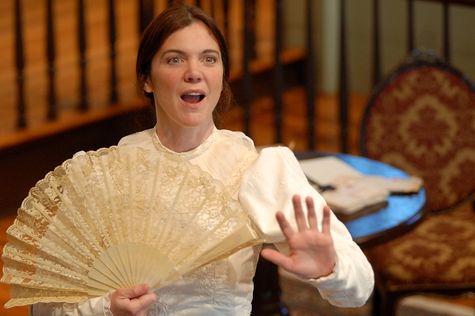
PARADISE FOUND Goff as Dickinson.
|
Between the deep-rooted American penchant for individualism and the suffragette and feminist movements, poet Emily Dickinson was bound to enter the literary canon. William Luce’s The Belle of Amherst, at 2nd Story Theatre through June 27, makes a vivid and convincing case for why we should be glad of that fact.
The engaging production is taking place at the historical statehouse in Bristol as a fundraiser to pay for air conditioning at the Warren theater.
A one-woman show, the monologue is delivered by Christin Goff and directed by Pat Hegnauer. Dickinson steps out in period garb, her hair in a bun, addressing us nervously as though we are unexpected guests. The performance space looks much like a courtroom, which is appropriate to the misunderstood poet, who had reason to worry about her unconventional poetry being judged.
Famous as a shy eccentric in her little Massachusetts town, she describes herself in the town’s terms as “Squire Dickinson’s half-cracked daughter.” She tells how in school she refused to scratch out the naughty bits in her Shakespeare textbook, as the teacher had instructed the class, and she exuberantly reads to us a string of bawdy quotes, culminating in “let copulation thrive!” Not yet a recluse in her early years, she would include inscrutable notes with cakes she would send to neighbors, inviting them to compare to see who had the oddest one.
The intensity with which Dickinson regarded poetry, if not life, was famously expressed: “If I feel physically as if the top of my head were taken off, I know that is poetry.” With that attitude, she knew that restraint was necessary to keep her poems from coming across like adolescent gushings. A poet must tell the truth but “tell it slant,” as she observes in one poem, presented here as though Dickinson is making a spontaneous observation. “The Truth must dazzle gradually. Or every man be blind,” she writes about limiting the exploding heads among her readership.
“Father’s house and my garden, this is my world,” she says, adding, “my paradise.” Of which she notes: “Paradise is no journey, because it is within.” Her father was gruff and normally unexpressive, but he was nevertheless a person who once ran to the church to ring the bell to alert the town to an aurora borealis display. When she was still a girl and he read her poetry, he unexpectedly allowed her to stay up late to write.
Dickinson, who died in 1886 at 55, gained a prominent lifelong mentor at 32 when she began corresponding with Thomas Wentworth Higginson, an Atlantic Monthly editor. He was supportive but somewhat baffled by the radical style of her breathless poetry, less critical of her in real life than in this play. They met face-to-face only twice; for dramatic purposes, playwright Luce has her shaken and traumatized by their first visit, which opens Act Two, when he calls her poems “spasmodic” and her rhymes “unruly.”
This unique poetic genius was so self-conscious about being judged, having had less than a dozen poems published over the years — of more than a thousand — that late in life she refused help to get a collection published. Most of her poems remain unread until after her death, when her sister discovered a huge cache under her bed. Higginson had them published four years later. As Dickinson wrote, those poems were “like an undelivered letter lost in transit.”